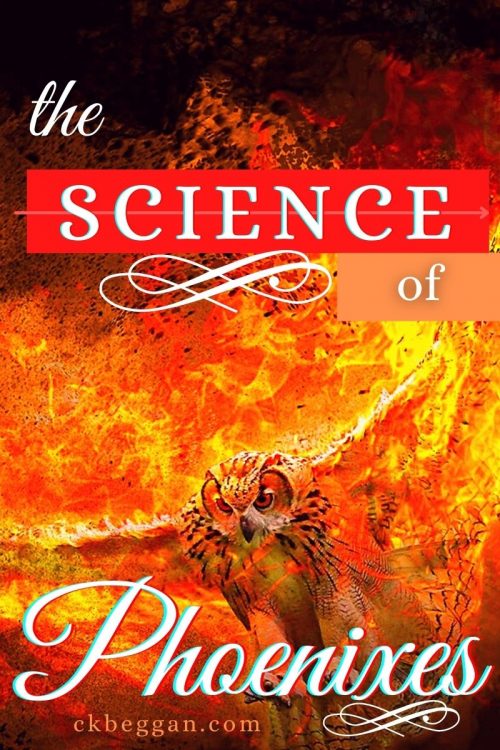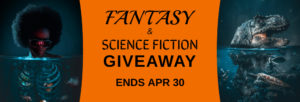
Recently, author Sarah K.L. Wilson (Sting Magic) posed a fun question in her newsletter. With her new series, Phoenix Heart, on the horizon, she made her own list of phoenix pros and cons (quoted with permission):
PHOENIX PROS
– they light things up!
– always good for toasting marshmallows!
– can’t keep them dead permanently
– vibrant personalities
PHOENIX CONS
– they tend to light things on fire by accident. Oops!
– these night owls are dead during the day – which is tough when you need their help!
– fiercely loyal to their riders, it’s hard to make them care about any other loyalties
– when you’re so beautiful, it’s hard not to look at your reflection in a passing lake.
Ms. Wilson then invited her readers to respond with their own pros and cons.
And that’s when I put my nerd thinking cap on.
I’ll be the first to tell you that, unlike my siblings, I’m not in STEM in any way, shape or form. I did pretty badly at science in school, as a matter of fact. But for whatever reason, science news really clicks for me. If only they could write text books like science articles, the whole subject would’ve made a whole lot more sense to me!
Some time ago, I heard an interview with a prominent figure in the field of neuroscience (I very much wish I could tell you her name), who discussed her theory on nutrition and human intelligence. I realize I’d never thought about the monsters and mythological creatures I read and write about that way: how do they eat, and what does that mean for how they function? Assuming this theory is correct, how creatures eat affects their behavior and abilities a lot.
After reading a recent Time article on why we dream, combined with some prior knowledge about neuroplasticity (the brain’s ability to change), I also started to think about instinct in monsters and mythological creatures. So, without further ado…
A Scientific Look at the Pros and Cons of Phoenixes
by C.K. Beggan
PRO
– Phoenixes always cook their food, and can be persuaded to share.
– No raw meat breath!
The Science: According to a neuroscience theory, cooked food is the key to human intelligence. Cooking makes nutrients more accessible to animals with inefficient digestion (in the case of a phoenix, one can’t fly when it takes hours to digest a simple meal, so digestion must be quick. That means not everything eaten can be broken down and absorbed, which equals fewer nutrients). Cooked food is easier to process and absorb nutrients from, which allows humans to have way more brain function than other animals. It takes a lot of nutrients to keep all our brain activity going, so cooking is key (plus it allows us to eat otherwise poisonous/tough things and increase nutrient sources). Phoenixes are also highly intelligent (of course!) and therefore benefit from cooking food like we do. Their brains would require it!
PRO
– Phoenixes are highly adaptable (you’d have to be, to get reborn!).
CON
– They’re vivid, active dreamers. Who wants to be kicked by a flaming bird dreaming about walking somewhere?
– Phoenixes are fairly helpless when reborn.
– Phoenixes may be prone to trauma after difficult or prolonged negative experiences.
The Science (!): Our ability to dream is a direct consequence of how adaptable our brains are (neuroplasticity). Without dreams, the human brain is so adaptable that it would lose space dedicated to sight when we sleep at night/during the long nights of winter when vision is limited. Dreams activate the vision portion of our brain and keep it intact. Animals born with a high degree of instinct, who can function well within hours of birth (e.g. species subject to predators that must be able to run away from day one) don’t have neuroplasticity/adaptability like we do. Therefore, they don’t require dreams like we do, because they won’t lose much by getting some shut eye. Their brains are more fixed. So if phoenixes are adaptable, they must dream like we do.
The consequence of this is that more neuroplasticity also means a period of prolonged danger or a traumatic event changes the brain. This is why humans experience PTSD (and/or effects on sleep, digestion, the immune system, you name it). A brain that adapts to danger helps a being in danger stay alive. Adapting back to safe conditions doesn’t happen quickly or easily, though. This could happen to anyone with an adaptable brain, even to the majestic phoenix!
Another example of this (if you even want one!) is that I was surprised by a spider in my bathroom recently. I am an arachniphobe. My brain considers spiders dangerous, so my fight or flight response was immediately triggered (I chose flight). Now I cannot go into that room without checking for a spider because my brain reminds me that spiders appear in my bathroom (and therefore the bathroom may be dangerous and must be approached with caution). Our brains are so flexible it doesn’t take much to create a new pattern of behavior! (On the other hand, if I saw an alligator in the lake, my brain would remind me to be careful around the lake and I’d be safer for it).
So a phoenix may have some hang ups like this, too. (My sister once worked with an arachniphobic sea lion, so even if your phoenix doesn’t have equal-to-human intelligence, it may refuse to go anywhere near webs and shriek). Therefore…
CON
– Despite being mighty, fire-clad animals, phoenixes can be fearful of tiny creatures and refuse to approach them no matter how much you try! A phoenix frightened of pigeons would be VERY inconvenient.
– Travel delays shall ensue.
Thanks for joining me on this mythological geek-out! If you’re a writer yourself (or just a mythology buff), I hope it encourages you to think of these creatures in a whole new light.
Cheers,
– CKB
PS: Do you think this should be a series of articles? What mythological creature do you think should be next? Let me know in the comments below!


